
America is a sleep-deprived nation
Sleep experts recommend adults get at least 7 to 9 hours of sleep every night. And yet, one in three Americans don’t get enough sleep. According to the American Sleep Apnea Association, more than 50 million Americans already suffer from more than 80 different sleep disorders while another 20 to 30 million suffer from intermittent sleep problems each year or meet the criteria for a sleep disorder and go undiagnosed.
“We make the case to get that extra hour of sleep to feel more rested,” says Rachel Salas, MD, associate professor of neurology at Johns Hopkins Medicine. “But we also know that with sleep deprivation you’re more likely to have memory and concentration issues, look tired, look older, and it can affect your metabolism, which can make you gain weight.”
It’s important to make an appointment with your doctor if you have trouble sleeping at night, sleep too much, or still feel exhausted after a full eight hours of sleep.
I Tried Valerian Root To Help Me Sleep for a Week—Here’s What Happened
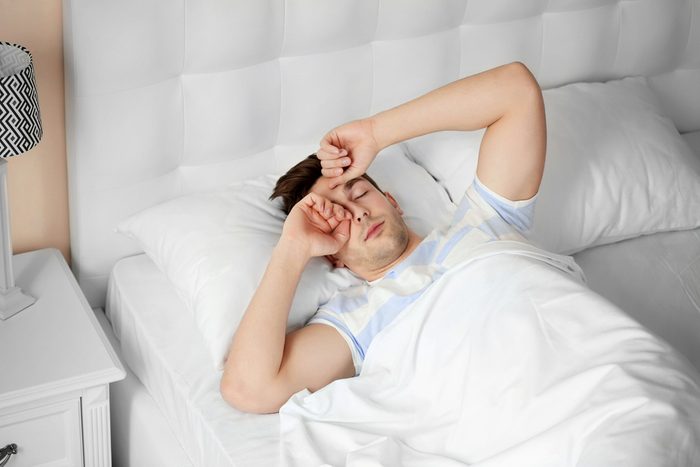
It can protect your heart
At the European Society of Cardiology Congress in Munich, a study indicated—and reiterated—that sleep deprivation and sleeping excessively can be bad for your heart. No one is sure why too much or too little sleep can be detrimental to the health of your heart, but it appears that “sleep influences biological processes like glucose metabolism, blood pressure, and inflammation—all of which have an impact on cardiovascular disease,” Epameinondas Fountas, MD, the study’s author who works at Onassis Cardiac Surgery Center in Athens, Greece told the Guardian. Based on data from more than one million adults from 11 studies, he and his team found that short sleepers had an 11% greater risk of coronary artery disease or stroke than those who got six to eight hours of sleep each night. The people who slept for more than eight hours had an increased risk for these heart problems by 33% over a nine-year period.
Tart Cherry Juice for Insomnia Is the Internet’s Latest Viral Trend—But Does It Work?
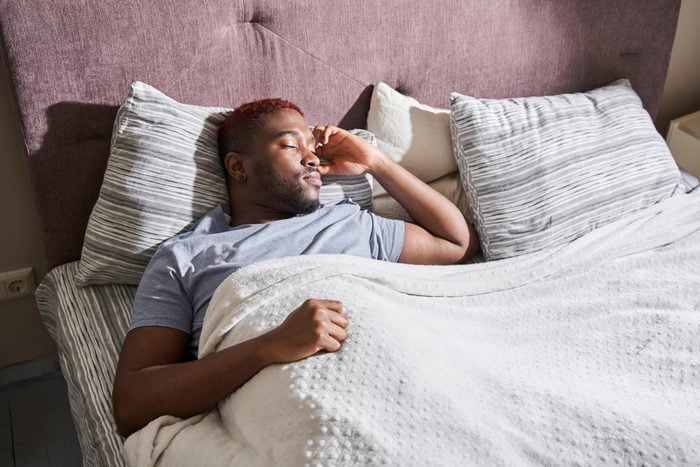
You’ll lower your risk for diabetes
“Even in young, healthy adults, just one night of sleep deprivation, which is considered to be less than six hours of sleep, can already change your metabolism,” says Salas. “When your metabolism changes, it has an effect on insulin.” A 2016 study found that chronically sleeping for less than six hours could be associated with Type 2 diabetes, a condition where your body makes too much insulin, but can’t use it to break down sugar in the blood. Research has also shown that even just four to five hours of sleep over one to 14 nights can greatly reduce your glucose tolerance and insulin sensitivity. In fact, prior studies have suggested that eight hours of sleep is best for maintaining metabolism regulation.
Lindsey Vonn Gets Candid about a 10-Year Health Struggle: “The Stress Made It Even Harder”
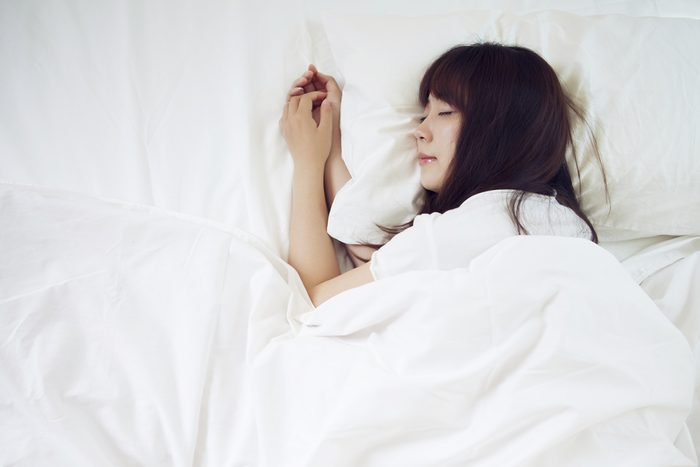
It can help you stay lean
Exercise and a well-balanced diet are essential for remaining healthy and trim, but a full night’s rest can also help keep the pounds off! A Nurses’ Health study followed nearly 60,000 women who were not obese for 16 years and found that those who slept for five hours or less each night increased their risk for becoming obese by 15% compared to women who got the recommended seven hours of sleep. Even more interesting is that the short sleepers were also more likely to gain 30 pounds over the course of the study—a 30% higher risk!
“People think sleep is just sedentary, so it can’t possibly help you lose weight, but lack of it mucks up our appetite hormones,” David Haslam, MD, chair of the National Obesity Forum told the Independent. A lack of sleep reduces our leptin levels and increases our ghrelin production, two hormones that either switch our appetites on or off. Plus, excessive fat may also cause more sleeping problems such as sleep apnea, a disorder where your breathing repeatedly stops and starts, which puts you at increased risk for heart attacks, strokes, diabetes, and more.
One Major Effect of Belly Fat on Early Death Risk, New Study Finds
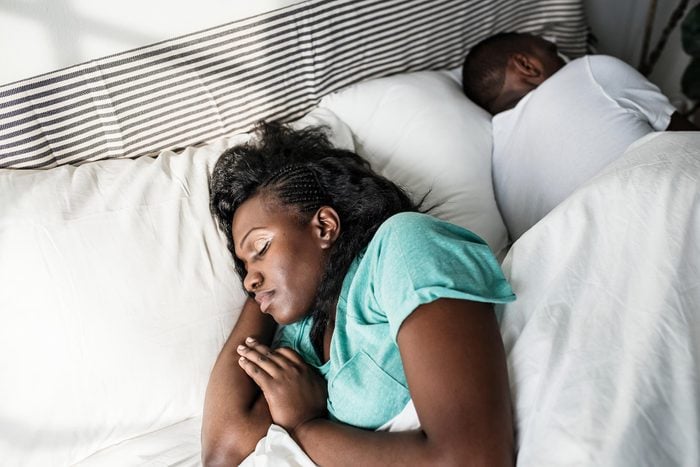
You may be more likely to be depressed
Studies suggest that insomniacs have a ten-fold risk of developing depression and may be more than twice as likely to report a suicide attempt compared to people who sleep well. Even people who suffer from obstructive sleep apnea could suffer from depression, according to a large study from the Centers for Disease Control and Prevention (CDC). The lead author stated that “snorting, gasping, or stopping breathing while asleep was associated with nearly all depression symptoms.”
Feeling Depressed? Change This One Common Habit, Says New Study
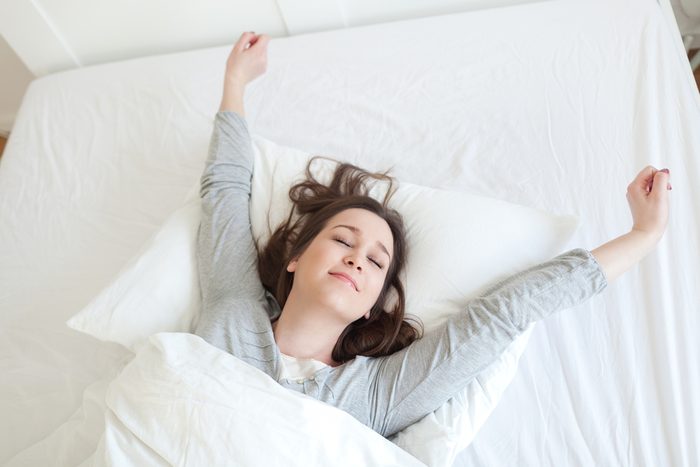
You can boost your immunity
“We know that if you don’t get enough or good quality sleep, your immunity can be negatively affected,” says Salas. “You’re more likely to have more colds and infections because you’re not going to be able to fight off viruses.” Proteins, known as cytokines, help fight off infection or inflammation when you’re sick. Your immune system typically releases these cytokines when you’re fast asleep and can also help promote good sleep. But after many sleepless nights, your body will see an overall reduction in its production of these infection-fighting cytokines, antibodies, and cells.

You’ll reduce your risk of dementia
The jury is still out on if poor sleep causes or exacerbates dementia or if dementia leads to bad sleeping quality. Yet, one study showed that people who don’t get good quality REM (rapid eye movement) sleep, the dream stage of sleep where your heart rate and breathing quicken, are at a higher risk for dementia. “REM sleep is considered the part of the sleep cycle where our brains get rejuvenated,” Eric Larson, MD, executive director of Kaiser Permanente Washington Health Research Institute, who didn’t author the study, told Reuters. “It’s considered the best part of sleep from a perspective of gaining the rest that restores well-being.” In the review of overnight sleep studies that looked at more than 300 adults who didn’t have dementia and were ages 60 and older, 10% of them developed dementia after an average follow-up of 12 years. The majority of the participants spent about 20 of their time asleep in the REM stage, but the people who were later diagnosed with dementia only spent about 17% of their sleeping time in REM. But researchers note that it’s unclear if reduced REM actually causes dementia or vice versa.